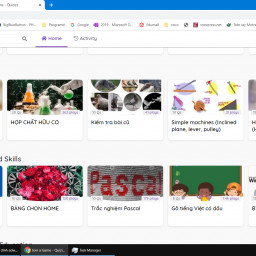1. THÌ HIỆN TẠI ĐƠN SIMPLE PRESENT
VỚI ĐỘNG TỪ THƯỜNG
Khẳng định: S + Vs/es + O
Phủ định: S + DO/DOES + NOT + V +O
Nghi vấn: DO/DOES + S + V+ O ?
VỚI ĐỘNG TỪ TOBE
Khẳng định: S + AM/IS/ARE + O
Phủ định: S + AM/IS/ARE + NOT + O
Nghi vấn: AM/IS/ARE + S + O
Từ nhận biết: always, every, usually, often, generally, frequently.
Cách dùng:
Thì hiện tại đơn diễn tả một chân lý, một sự thật hiển nhiên.
Ví dụ: The sun ries in the East.
Tom comes from England.
Thì hiện tại đơn diễn tả 1 thói quen, một hành động xảy ra thường xuyên ở hiện tại.
Ví dụ: Mary often goes to school by bicycle.
I get up early every morning.
Lưu ý: ta thêm "es" sau các động từ tận cùng là: O, S, X, CH, SH.
Thì hiện tại đơn diễn tả năng lực của con người
Ví dụ: He plays badminton very well
Thì hiện tại đơn còn diễn tả một kế hoạch sắp xếp trước trong tương lai hoặc thời khoá biểu, đặc biệt dùng với các động từ di chuyển.
2. THÌ HIỆN TẠI TIẾP DIỄN - PRESENT CONTINUOUS
Công thức
Khẳng định: S + be (am/ is/ are) + V_ing + O
Phủ định: S + BE + NOT + V_ing + O
Nghi vấn: BE + S + V_ing + O
Từ nhận biết: Now, right now, at present, at the moment
Cách dùng thì hiện tại tiếp diễn
Thì hiện tại tiếp diễn tả một hành động đang diễn ra và kéo dài dài một thời gian ở hiện tại.
Ex: The children are playing football now.
Thì này cũng thường tiếp theo sau câu đề nghị, mệnh lệnh.
Ex: Look! the child is crying.
Be quiet! The baby is sleeping in the next room.
Thì này còn diễn tả 1 hành động xảy ra lặp đi lặp lại dùng với phó từ ALWAYS:
Ex: He is always borrowing our books and then he doesn't remember -
Thì này còn được dùng để diễn tả một hành động sắp xảy ra (ở tương lai gần)
Ex: He is coming tomrow
Lưu ý: Không dùng thì này với các động từ chỉ nhận thức chi giác như: to be, see, hear, understand, know, like, want, glance, feel, think, smell, love. hate, realize, seem, remmber, forget,..........
Ex: I am tired now.
She wants to go for a walk at the moment.
Do you understand your lesson?
3. THÌ HIỆN TẠI HOÀN THÀNH - PRESENT PERFECT
Khẳng định: S + have/ has + Past participle (V3) + O
Phủ định: S + have/ has + NOT + Past participle + O
Nghi vấn: have/ has + S + Past participle + O
Từ nhận biết: already, not...yet, just, ever, never, since, for, recenthy, before...
Cách dùng thì hiện tại hoàn thành:
Thì hiện tại hoàn thành diễn tả hành động đã xảy ra hoặc chưa bao giờ xảy ra ở 1 thời gian không xác định trong quá khứ.
Thì hiện tại hoàn thành cũng diễn tả sự lập đi lập lại của 1 hành động trong quá khứ.
Thì hiện tại hoàn thành cũng được dùng với since và for.
Since + thời gian bắt đầu (1995, I was young, this morning etc.) Khi người nói dùng since, người nghe phải tính thời gian là bao lâu.
For + khoảng thời gian (từ lúc đầu tới bây giờ) Khi người nói dùng for, người nói phải tính thời gian là bao lâu.
4. THÌ HIỆN TẠI HOÀN THÀNH TIẾP DIỄN - PRESENT PERFECT CONTINUOUS
Khẳng định: S has/ have + been + V_ing + O
Phủ định: S + Hasn't/ Haven't + been+ V-ing + O
Nghi vấn: Has/ Have+ S+ been + V-ing + O?
Từ nhận biết: all day, all week, since, for, for a long time, almost every day this week, recently, lately, in the past week, in recent years, up until now, and so far.
Cách dùng thì hiện tại hoàn thành:
Thì hiện tại hoàn thành tiếp diễn nhấn mạnh khoảng thời gian của 1 hành động đã xảy ra trong quá khứ và tiếp tục tới hiện tại (có thể tới tương lai).
5. THÌ QUÁ KHỨ ĐƠN - SIMPLE PAST
VỚI ĐỘNG TỪ THƯỜNG
Khẳng định: S + V_ed + O
Phủ định: S + DID+ NOT + V + O
Nghi vấn: DID + S+ V+ O ?
VỚI TOBE
Khẳng định: S + WAS/ WERE + O
Phủ định: S+ WAS/ WERE + NOT + O
Nghi vấn: WAS/WERE + S+ O ?
Từ nhận biết: yesterday, yesterday morning, last week, las month, last year, last night.
Cách dùng thì quá khứ đơn:
Thì quá khứ đơn diễn tả hành động đã xảy ra và kết thúc trong quá khứ với thời gian xác định.
CHỦ TỪ + ÐỘNG TỪ QUÁ KHỨ
When + thì quá khứ đơn (simple past)
When + hành động thứ nhất
6. THÌ QUÁ KHỨ TIẾP DIỄN - PAST CONTINUOUS
Khẳng định: S + was/ were + V-ing + O
Phủ định: S + wasn't/ weren't + V-ing + O
Nghi vấn: Was/Were + S+ V-ing + O?
Từ nhận biết: While, at that very moment, at 10:00 last night, and this morning (afternoon).
Cách dùng thì quá khứ tiếp diễn:
Dùng để diễn tả hành động đã xảy ra cùng lúc. Nhưng hành động thứ nhất đã xảy ra sớm hơn và đã đang tiếp tục xảy ra thì hành động thứ hai xảy ra.
CHỦ TỪ + WERE/ WAS + ÐỘNG TÙ THÊM - ING
While + thì quá khứ tiếp diễn (past progressive)
7. THÌ QUÁ KHỨ HOÀN THÀNH - PAST PERFECT
Khẳng định: S + had + Past Participle (V3) + O
Phủ định: S + hadn't + Past Participle + O
Nghi vấn: Had + S + Past Participle + O?
Từ nhận biết: after, before, as soon as, by the time, when, already, just, since, for....
Cách dùng thì quá khứ hoàn thành:
Thì quá khứ hoàn thành diễn tả 1 hành động đã xảy ra và kết thúc trong quá khứ trước 1 hành động khác cũng xảy ra và kết thúc trong quá khứ.
8. THÌ QUÁ KHỨ HOÀN THÀNH TIẾP DIỄN - PAST PERFECT CONTINUOUS
Khẳng định: S + had + been + V-ing + O
Phủ định: S + hadn't + been+ V-ing + O
Nghi vấn: Had + S + been + V-ing + O?
Từ nhận biết: until then, by the time, prior to that time, before, after.
Cách dùng thì quá khứ hoàn thành tiếp diễn:
Thì quá khứ hoàn thành tiếp diễn nhấn mạnh khoảng thời gian của 1 hành động đã đang xảy ra trong quá khứ và kết thúc trước 1 hành động khác xảy ra và cũng kết thúc trong quá khứ
9. THÌ TƯƠNG LAI - SIMPLE FUTURE
Khẳng định: S + shall/will + V(infinitive) + O
Phủ định: S + shall/will + NOT+ V(infinitive) + O
Nghi vấn: shall/will + S + V(infinitive) + O?
Cách dùng thì tương lai:
Khi đoán (predict, guess), dùng will hoặc be going to.
Khi chỉ dự định trước, dùng be going to không được dùng will.
CHỦ TỪ + AM (IS/ ARE) GOING TO + ÐỘNG TỪ (ở hiện tại: simple form)
Khi diễn tả sự tình nguyện hoặc sự sẵn sàng, dùng will không được dùng be going to.
CHỦ TỪ + WILL + ÐỘNG TỪ (ở hiện tại: simple form)
10. THÌ TƯƠNG LAI TIẾP DIỄN - FUTURE CONTINUOUS
Khẳng định: S + shall/will + be + V_ing+ O
Phủ định: S + shall/will + NOT+ be + V_ing+ O
Nghi vấn: shall/will +S+ be + V_ing+ O
Từ nhận biết: in the future, next year, next week, next time, and soon.
Cách dùng thì tương lai tiếp diễn:
Thì tương lai tiếp diễn diễn tả hành động sẽ xảy ra ở 1 thời điểm nào đó trong tương lai.
CHỦ TỪ + WILL + BE + ÐỘNG TỪ THÊM -ING hoặc
CHỦ TỪ + BE GOING TO + BE + ÐỘNG TỪ THÊM -ING
11. THÌ TƯƠNG LAI HOÀN THÀNH - FUTURE PERFECT
Khẳng định: S + shall/will + have + Past Participle
Phủ định: S + shall/will + NOT+ be + V_ing+ O
Nghi vấn: shall/will + NOT+ be + V_ing+ O?
Từ nhận biết: by the time and prior to the time (có nghĩa là before)
Cách dùng thì tương lai hoàn thành:
Thì tương lai hoàn thành diễn tả 1 hành động trong tương lai sẽ kết thúc trước 1 hành động khác trong tương lai.
CHỦ TỪ + WILL + HAVE + QUÁ KHỨ PHÂN TỪ (PAST PARTICIPLE)
12. THÌ TƯƠNG LAI HOÀN THÀNH TIẾP DIỄN - FUTURE PERFECT CONTINUOUS
Khẳng định: S + shall/will + have been + V_ing + O
Phủ định: S + shall/will + NOT+ have been + V_ing + O
Nghi vấn: shall/will + S+ have been + V_ing + O?
Cách dùng thì tương lai hoàn thành tiếp diễn:
Thì tương lai hoàn thành tiếp diễn nhấn mạnh khoảng thời gian của 1 hành động sẽ đang xảy ra trong tương lai và sẽ kết thúc trước 1 hành động khác trong tương lai.
Khi chỉ dự định trước, dùng be going to không được dùng will.
CHỦ TỪ + AM (IS/ARE) GOING TO + ÐỘNG TỪ (ở hiện tại: simple form)
Khi diễn tả sự tình nguyện hoặc sự sẵn sàng, dùng will không được dùng be going to.
CHỦ TỪ + WILL + ÐỘNG TỪ (ở hiện tại: simple form)
hiện tại đơn, hiện tại tiếp diễn, hiện tại hoàn thành, hiện tại hoàn thành tiếp diễn, thì quá khứ đơn, thì quá khứ tiếp diễn, quá khứ hoàn thành, thì quá khứ hoàn thành tiếp diễn, thì tương lai, thì tương lai tiếp diễn, thì tương lai hoàn thành, thì tương lai hoàn thành tiếp diễn,




































